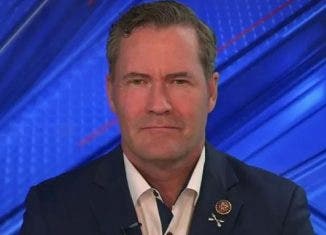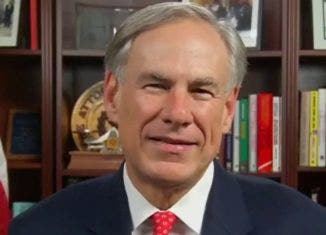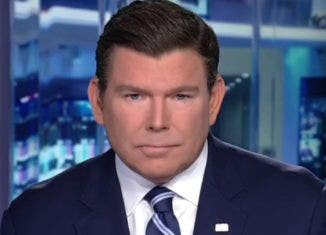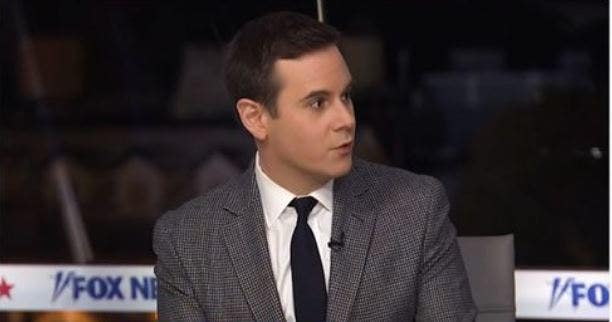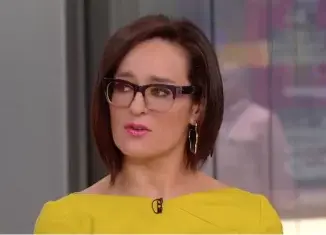Senate Majority Leader Mitch McConnell: As Congress Continues To Responds To Coronavirus, I Will Not Allow The Passage Of Irrelevant Policies Under The Guise Of Pandemic Relief
FOX News Radio’s Guy Benson sat down for an exclusive interview with Senate Majority Leader Mitch McConnell (R-KY) to discuss the Coronavirus, a possible phase four relief package & more.
Listen Below:
FULL Transcript:
GUY BENSON, FOX RADIO HOST: Joining me now is the majority leader of the United States Senate, Mitch McConnell, Republican of Kentucky. And Senator, it’s great to have you back on the show.
SEN. MITCH MCCONNELL (R-KY), SENATE MAJORITY LEADER: Guy, glad to be with you. This is an eerie feeling right now, isn’t it?
BENSON: It really is quite strange. I’m sitting in my house doing this show, and it’s almost — it feels like I’m talking to myself. I know that there are so many people out there listening. It’s just odd. You look out the window, people aren’t out. And it’s for good reason, but especially for an extrovert like myself it’s actually driving me crazy.How are you doing, you and your family? People see you as though (ph) —
(CROSSTALK)
MCCONNELL: Well, I’m sitting at my house —
(CROSSTALK)
BENSON: — you’re this politician with all this power —
MCCONNELL: — talking to you in your house.
(LAUGHTER)
BENSON: Are you down in Kentucky?
MCCONNELL: No, I — we decided to stay in Washington, which there’s certain advantages to it. Although I suppose you could be in either place. I’ve actually been quite busy on the phone doing things like you and I are doing, and then some other things as well. It turns out you can still be productive at home.
BENSON: Yes. And I think a lot of people are adjusting to that new normal.I want to ask you about something. I’ve seen seemingly sort of an increase in this type of commentary, this strain of commentary that the bill that you guys passed out of the Senate and then finally the House signed by the president really doesn’t do all that much for people. And the way that it’s been framed is that it’s a one time payment for some Americans of $1,200, and that’s basically it. And I know that’s wrong on the facts. I don’t love every single provision in the bill, but overall, it does much, much more beyond a one time payment. I’m just wondering if you could walk us through and fact check that. How does the bill — that is now law — help workers and businesses?
MCCONNELL: Well, it is a rescue package. It’s not expected to go on forever. That part is certainly the case. We’re trying to bridge the gap here between where we are today and where we hope to be once this pandemic has experienced a curve — a curve downward. And so we are trying to get direct money into the hands of individuals and to small businesses and big businesses too who are in trouble and losing employees have an opportunity through the Treasury Stabilization Fund to receive assistance as well and they can show that.So — and that’s – it is emergency. It’s not supposed to be permanent change. In fact, that’s what I was trying to fend off when the speaker of the House decided to try to come over to the Senate and tell us how to write the bill.She wanted to practice what Rahm Emanuel famously said after the financial crisis in 2008, said never let a crisis go to waste. In other words, seize upon crisis to try to makes systemic or policy changes you couldn’t otherwise pass. So yes, it was designed to be a rescue package. It’s hard to argue that $2 trillion is not a lot of money.
BENSON: Right.
MCCONNELL: It certainly won’t be enough if this persists.And the reason I’m hoping just about every American is following the advice of Dr. Fauci and Dr. Birx and staying in their homes is that we can begin to see this decline.The worst is apparently going to still occur for another few weeks, and that’s how I would describe it, yes. It — it — most of this is temporary. It’s — it’s not designed to be a permanent state of affairs.
BENSON: Well, it should be. Yes, you know it — I mean it absolutely should be, but it is critically necessary, which is why fiscal conservatives are embracing it, because it’s such a strange confluence of events. It’s very scary — where businesses that were thriving through no fault of their own were forced to be on pause because of a global pandemic. That’s not their fault, hence all of this assistance.The bill also has — the new law — billions and billions of dollars for public health needs and hospitals.People I think, Senator, heard, well, there’s tens of billions — hundreds of billions for corporations and businesses. Well, yes, it’s not — you’re just not cutting giant checks to CEOs. This is money, loans, and grants to help people stay on the payrolls, to help the workers.
MCCONNELL: Absolutely. Absolutely. I mean nobody did anything wrong here. The government at the state level, the local level, and the federal level basically shut down the economy to try to deal with this pandemic.So nobody did anything wrong. We’re trying to make people as close to whole, or at least prevent massive layoffs of people by providing financial backup – this is (ph) businesses of all sizes. And also I certainly don’t want to leave out these brave healthcare workers all across America and the strains that hospitals are under — substantial assistance to them and that may need to be plussed (ph) up later. What I disagree with the speaker on is she’s already saying we need to work on phase four. Well look, the current law has not been in effect for even a week yet. We need to —
BENSON: And people haven’t gotten their checks.
MCCONNELL: Yeah, I mean the implementation of this — the Treasury Department’s got a massive, complicated problem here in getting all of this money out rapidly. And the speaker is already talking about phase four. Well, we may need a phase four, but we’re not even fully into phase three yet. This was the third coronavirus bill that we’ve passed, and the biggest one by far. And it was crafted by a Republican majority in the Senate, approved without a single dissenting vote.And I’ve got a significant number of members who under other circumstances would simply not have voted for a bill like this. This was not like ’08 where banks had made mistakes and lending – underwriting had been ignored, and a variety of other mistakes were made. Here, no mistake was made, we just got hit by this enemy. And this is the only way to respond to it according to our public health professionals.
BENSON: All right, so let me drill down a little bit. Starting with phase three, I don’t want to look backwards too much, but we heard from the speaker over the weekend that the reason that she was finally willing to abandon her ridiculous bill that was going to be just dead on arrival, I think even in her own chamber, and embrace the Senate bill is that Chuck Schumer and the Democrats filibustered and negotiated and turned if from a pro-corporation bill into a pro-worker bill. That strikes me based on many of my sources, to be rewriting of history. Can you just maybe briefly comment on whether the product that you guys had initially put together on last Sunday – one Sunday ago, how different that looked from the final product that, according to the Democrats, is night and day that they can finally rally around?
MCCONNELL: Yes, and that’s of course just not accurate. There is assistance to corporations — that by the way, these are the people who hire folks, they provide jobs, and when you’re attacking the employer, you’re not doing the employee any favor.
(CROSSTALK)
BENSON: Right.
(CROSSTALK)
MCCONNELL: — traditional Democratic talking points. They’re always after corporations. Who do they think employs a lot of people? In the final bill we did do some things that the Democrats in the Senate wanted, for example – I’ll give you an example, one that may or may not work out well. We actually did not like — but the Democrats insisted on as a condition to get onboard in the Senate — an unemployment insurance provision that actually pays people more not to work than to work —
BENSON: Right.
MCCONNELL: We thought that was a perverse incentive. And we’ll see – we’ll see what the statics are during this period, whether a lot of people decide it’s just simply not – there’s no point in going to work if they could make more staying at home. We did object to that, but it was a bipartisan deal.What we also rejected was a whole laundry list of completely unrelated items that Pelosi, Sunday a week ago, wanted to shoehorn into this deal that has to do with all of these left-wing agenda items that they’ve been pursuing over there and some other areas where there are problems, but it doesn’t have anything to do with the coronavirus situation.For example, pension reform. Well, yes, we need to do something on pension reform, but it had nothing to do with this subject. And she wanted to shoehorn that into — into the bill as well. So look, it’s not in dispute that what they were trying to do was take advantage of the crisis to accrue (ph) things unrelated to the crisis that they couldn’t get through the Senate otherwise. No question about that.
BENSON: So on phase four — that’s a perfect segue into the next step of this. You have conceded, yes, a phase four might be necessary. Let’s see what comes down the pike and what the needs of the American people and the American economy and the American healthcare industry, for example, might be in a number of weeks. But can you tell us with certainty that if the Democrats in phase four start pushing for some of this ancillary stuff again — permanent changes, things that are completely nongermane to the crisis that you will make sure that does not happen in the U.S. Senate?
MCCONNELL: Yes, we’re not going to be doing in the name of an emergency items unrelated to the emergency. And I think even on doing rescue bill number four, we need to make it fact based.And in order to have facts, Guy, we need to learn more. And we’re in that period now. How quickly did the checks get out? Did they make a difference in time? How many — how many of the loans were consummated and (ph) were they in time? In other words, how did the $2 trillion bill work because it’s designed —
(CROSSTALK)
BENSON: Right, assess it.
MCCONNELL: Yes. It’s designed to all play out very rapidly, very rapidly. This is a rescue package to deal with about a four month period. And I think before we go at this again — remember this is $2 trillion we added to the debt. We need to make certain that any further actions we take are directly related to this public health crisis.
BENSON: Let me ask you this and it has to do with future actions, congressional actions. It seems like the House is out of town, they’re on a recess. You guys in the Senate, you’re also on a recess. You have members scattered all over the country. You have responded to some criticism frankly, of people saying, it’s nuts to have our legislative bodies not in session, or at least in town, if they need to respond potentially quickly to twists and turns in this uncertain, ongoing pandemic and related crisis. You have said that you’re confident the Senate can remain nimble. What do you mean by that exactly? If something had to come up almost immediately, if there was an urgent vote, what would that nimbleness look like in practice?
MCCONNELL: Well, we would call people back. I mean we — the last week that we were in was originally scheduled to be a recess. I cancelled the recess, our members were here and all but four of them voted. And the reason the four Republicans did not vote — one of them had either tested positive for the coronavirus, or the other three were in quarantine because they had interacted with the one who tested positive. So through practicing the social distancing we were able to function here in the capital. And if need be, the Senate will come back into session again practicing the distancing and precaution (ph) that we practiced while we were here. So yeah, we’re out of session —
BENSON: Although —
MCCONNELL: — until the 20th, but that’s subject to the call of the majority leader if the situation requires it.
BENSON: Although Senator, I do have to say, watching the bill pass – I watch far too much C-SPAN 2 than I would care to admit. But I, especially in big weeks, I watch a lot of C-SPAN 2. And as there were votes on amendments and then final passage, a lot of your colleagues – many of them sort of in the danger zone age-wise on coronavirus were down in the well of the Senate floor chatting with each other in pretty close proximity. And you had, as you just mentioned, one of your colleagues, also from your home state, sidelined with coronavirus, others in quarantine. If there were more exposures and more senators in quarantine, where maybe the Democrats would in fact have more voting members than Republicans, or there wouldn’t be a quorum, or something like that – I just wonder how much consideration you’ve given to the possibility of secure, remote voting? I know that as a leader that’s not something that you’re terribly excited about, because a lot of the cajoling happens in person. But given these extraordinary circumstances, are you perhaps rethinking that issue or thinking about it differently at all?
MCCONNELL: No, I’m not. And that’s one of the few things that the speaker of the House and I agree on. Look, we can work with this pandemic if we have to. We did before, and we can again if we need to reassemble. And we’ll make a decision on what to do on April 20th, which is the current comeback date for both the House and the Senate, as we get closer to the date.
BENSON: OK last question and it is a purely political question pivoting from the public health crisis and legislation to the upcoming election. And we have Ronna McDaniel, the chairwoman of the RNC, coming up in the next hour. I was looking at some numbers reported today, I think by “The Washington Post,” about the big Democratic super PAC which they call Senate Majority PAC, and some of the ad-buys that they’re already placing in key states where there are Senate races. Almost $16 million in Arizona, they’re going to try to take out Martha McSally. More than $5 million in Colorado against Cory Gardner. Thirteen million in Iowa, which is a pretty inexpensive state, relatively speaking, to come for Joni Ernst. Almost $10 million in Maine, Susan Collins. A whopping $25 million in North Carolina, Thom Tillis. There’s some big money flowing into those races. It’s going to be a tough cycle, I think, for Senate Republicans. As things stand now, looking at the Democrats sort of battleship getting ready for Senate races, and as you think about trying to hold on to the Republican majority, what is your current assessment? Or is it hard to do an assessment right now given all these externalities that have nothing to do with politics?
MCCONNELL: Well the Senate Leadership Fund, which is an outside group like the Senate Majority PAC — the Senate Leadership Fund which supports Republicans has placed in all of those states as well like amounts of money during the same period. What these were telegraphing (ph) about both sides, what they were going to do in the last eight weeks of the fall campaign. And it was roughly even between the two sides. I think that reflects that this is going to be a knock-down, drag-out fight. I’ve got 23 members up, the Democrats only have 12. We have one really good pick up opportunity in Alabama. We expect to win there, that would put us at 54, we currently have 53. And then we have really competitive races in Colorado, Arizona, New York, Maine, Iowa. And they’re certainly spending a lot of money in Kentucky as well. My opponent’s been able to raise over $20 million online, and she’s been on the air consistently for six months. So yeah, it’s going to be — it’s going to be like a knife fight in an alley. And I still think we have an excellent chance to hold on to our majority. And we won’t — we’re going to have enough money to be competitive. And that announcement today that you’re referring to is very similar to an announcement the Senate Leadership Fund made about a week ago in the same states.
BENSON: All right. So buckle up. It’s going to be a bumpy ride ahead politically and otherwise. Senate Majority Leader Mitch McConnell on the “Guy Benson Show.” Senator, thank you very much for your time today.
MCCONNELL: Thank you, Guy.
Thank you,


